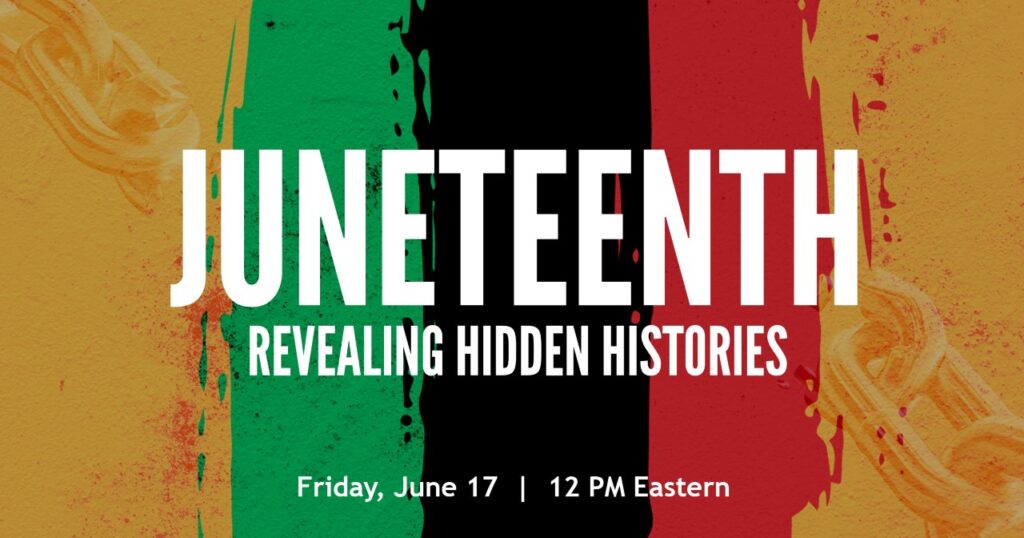‘Do Not Forget the Things Your Eyes Have Seen’
Juneteenth, Hidden Histories, and the Distance between Emancipation to Freedom
This year offers the nation our first opportunity to honor and celebrate Juneteenth since it became a federally-recognized holiday last year, thanks to the decades-long advocacy of Opal Lee, a 95-year old community activist and cultural historian from Texas who spearheaded the Juneteenth movement. Though many communities of African descent have been celebrating the day that the news of emancipation reached the last enslaved people in Galveston, Texas for years, the value of preserving history and celebrating abolition takes on new significance this year as access to cultural historical education has become a bone of contention and a political rallying point in every setting of government from local school boards to state legislatures across the nation. Under the guise of opposing “critical race theory” and “divisive concepts,” efforts to keep the truths of our nation’s history hidden and eliminate antiracist education are helping to widen political divisions and protect the privileged delusions of white supremacy.
In the Hebrew Scriptures, the God who covenants with the newly emancipated Israelites, sets out patterns for community and spiritual flourishing as “laws” given to Moses. Throughout this covenant-making, God implores the community to remember their history and to teach it to their children. For example, in Deuteronomy God implores the people: “But take care and watch yourselves closely, so as neither to forget the things that your eyes have seen nor to let them slip from your mind all the days of your life; make them known to your children and your children’s children— how you once…” (Deut. 4:9-10, NRSVUE). Repeatedly throughout these covenantal instructions, the people are reminded to remember their own histories and the stories of God’s unfolding love in action, and to hold that memory as central to their communal identity. And not just the triumphant or easy parts, but also the hardships and suffering. As the people journeyed through the wilderness from emancipation to freedom, God knew they needed to hold close the truth of what had been so that they could imagine who they were being called to become. Remembering and teaching history is an essential spiritual practice for communities of liberation.

Juneteenth reminds us that many of the truths of history that we as a nation need to hold close have been hidden to preserve a narrative of racial superiority, progress, and democracy. As a sacred acknowledgement of God’s people of African descent, Juneteenth remembers and honors the generations of untold stories that are waiting to be revealed within these sacred lives, stories that reach back to the cradle of civilization on the continent of Africa and reach forward into the abolitionist future we are building. We need these lineages that trace the connections between the people and the land and liberation so that we can more fully know the Divine Mystery that has been moving as love and justice in the world before time began. That’s why the UCC’s Juneteenth 2022 Celebration features African and African American descendants— geniuses of spoken word and cultural oral traditions—revealing hidden histories: so that all of us can take up our parts in the unfolding story of God’s liberating love.
Ostensibly, when the Emancipation Proclamation was made by President Abraham Lincoln on January 1, 1863, “all persons held as slaves within any State” should have been “then, thenceforward, and forever free.” But the historical truth is that there was some distance between the declaration of emancipation and the realization of freedom. Emancipation unfolded, community by community, across the nation over the course of years. In fact, one might say that emancipation is still unfolding in a nation marked by pervasive racialized inequities. The story of Juneteenth shows us that there is often some distance between our declarations of emancipation in our antiracist intentions and statements, and the realization of freedom in our antiracist actions and practices. As faithful people committed to liberation, we will always be on the journey to fully realizing freedom and remembering the truths of our past and revealing the histories that have been hidden is an essential part of that journey.
Dr. Sharon R. Fennema is the Curator for Join the Movement
Have you Joined the Movement for racial justice?
Related News
State of the (Dis)Union: Our Constitutional Crisis
In the 45 days since Inauguration Day, we have witnessed overwhelming changes in our federal...
Read MoreCrisis Control: An International Conflict Roundup
In a world embroiled in conflict, it is hard to know where to focus one’s time, energy, and...
Read MoreLeading with Love in 2025
This new year brings us a new Congress, new administration, and new political landscape across...
Read More
